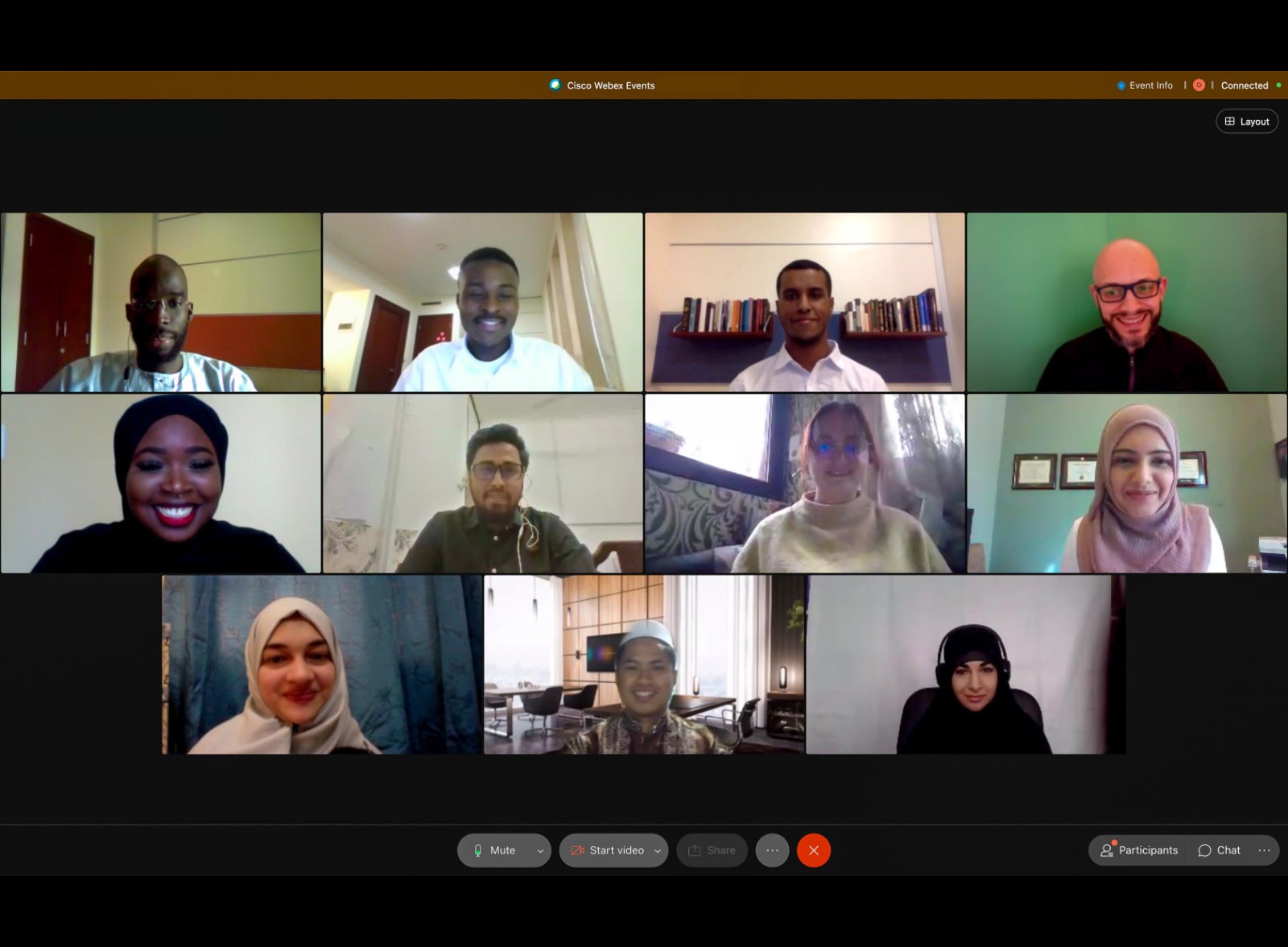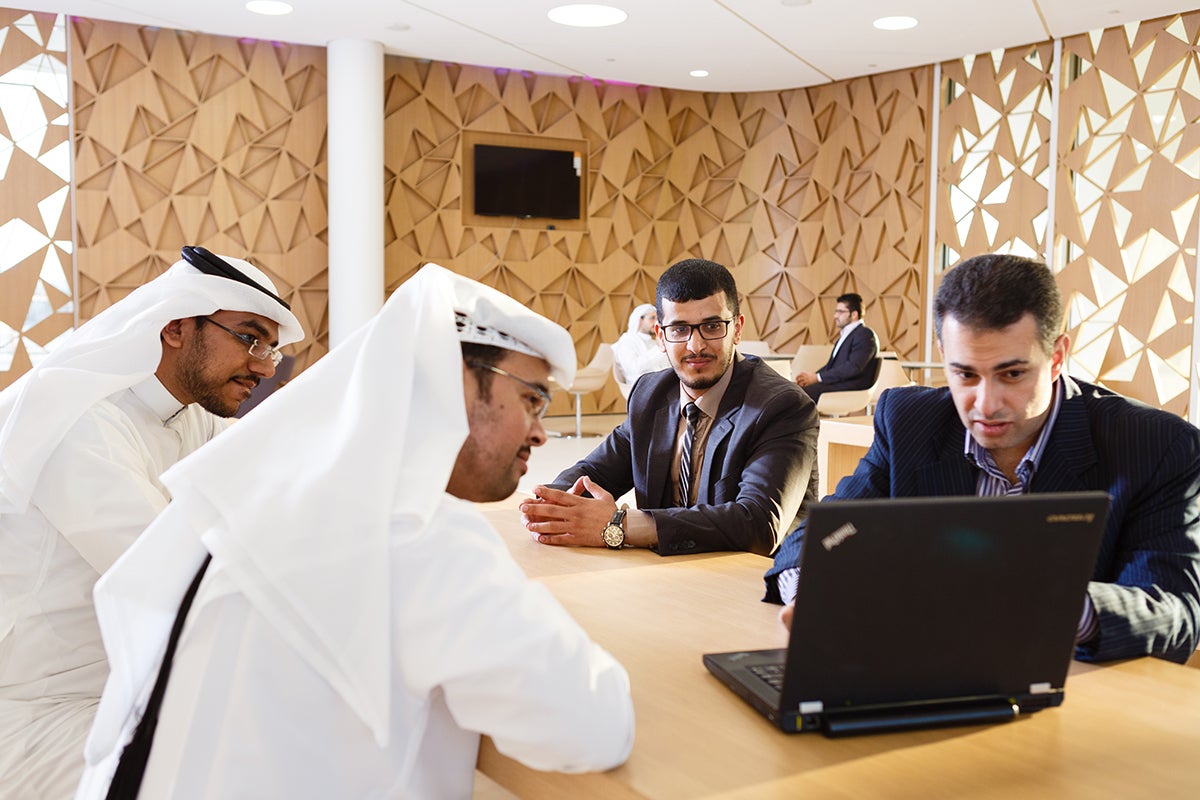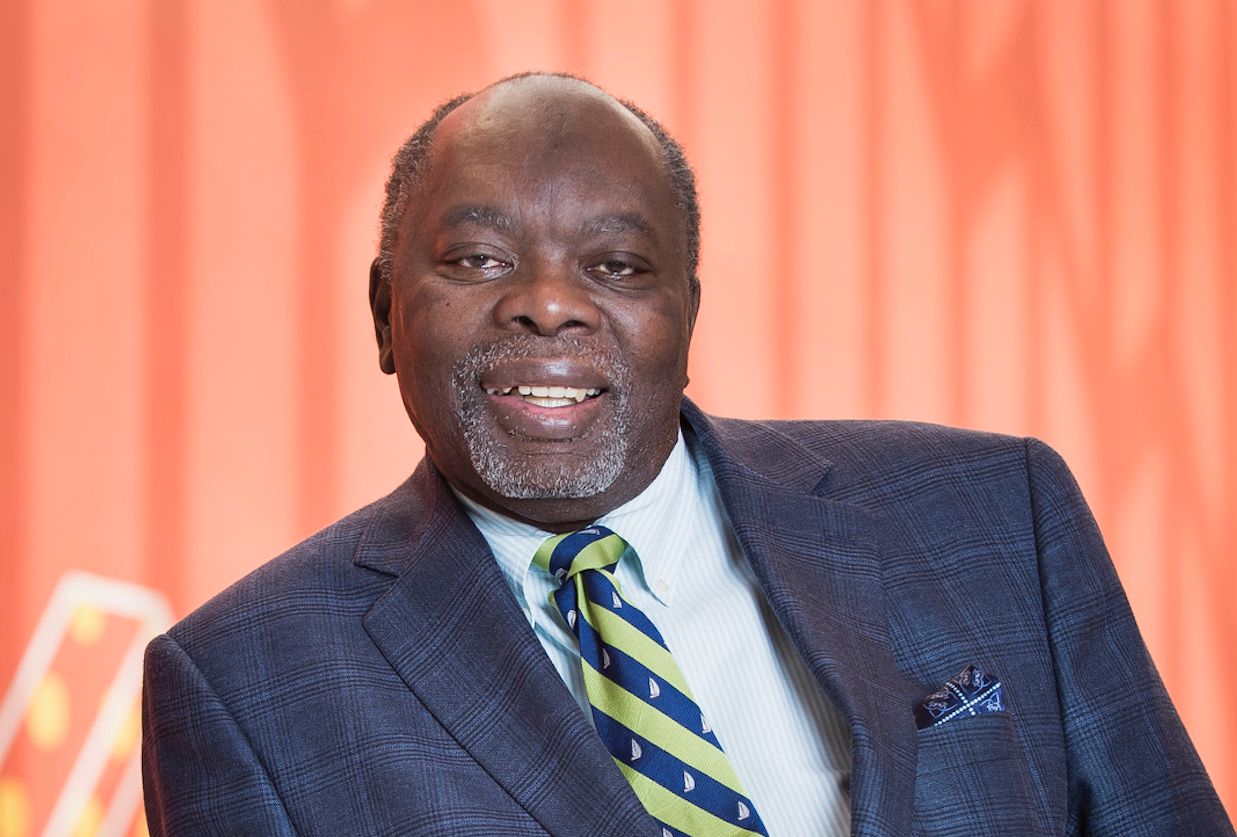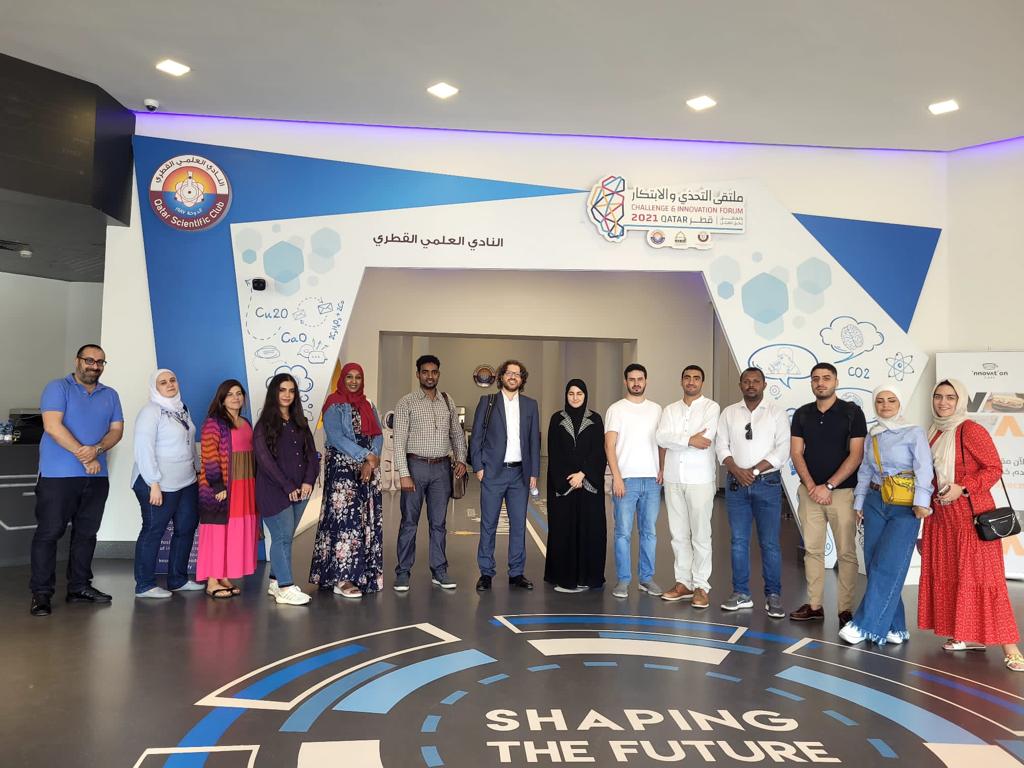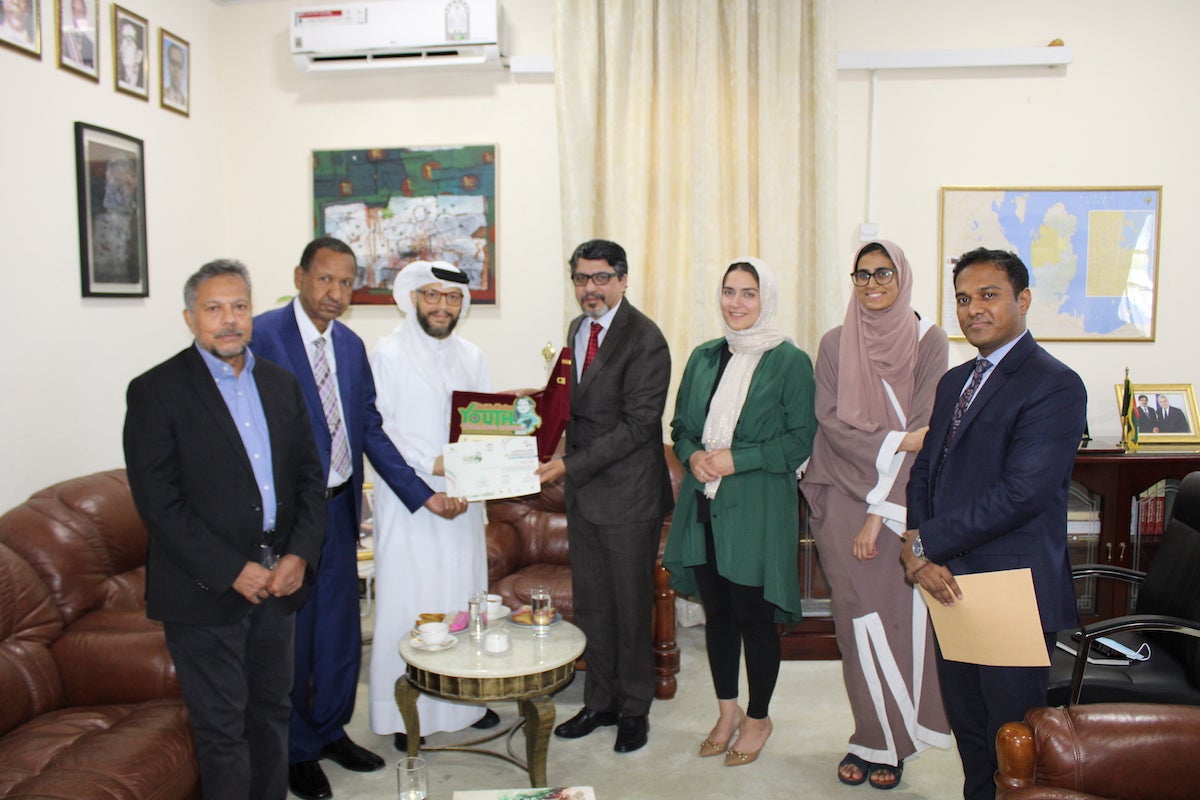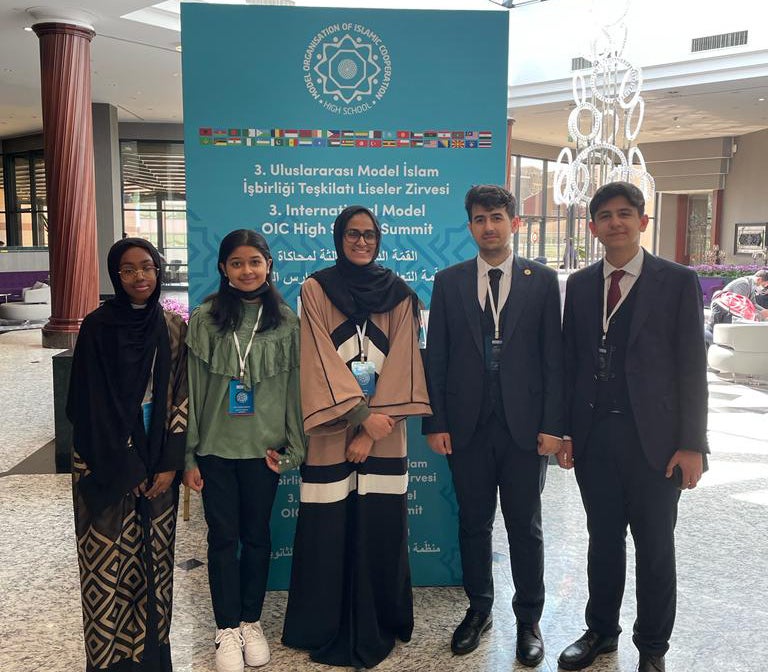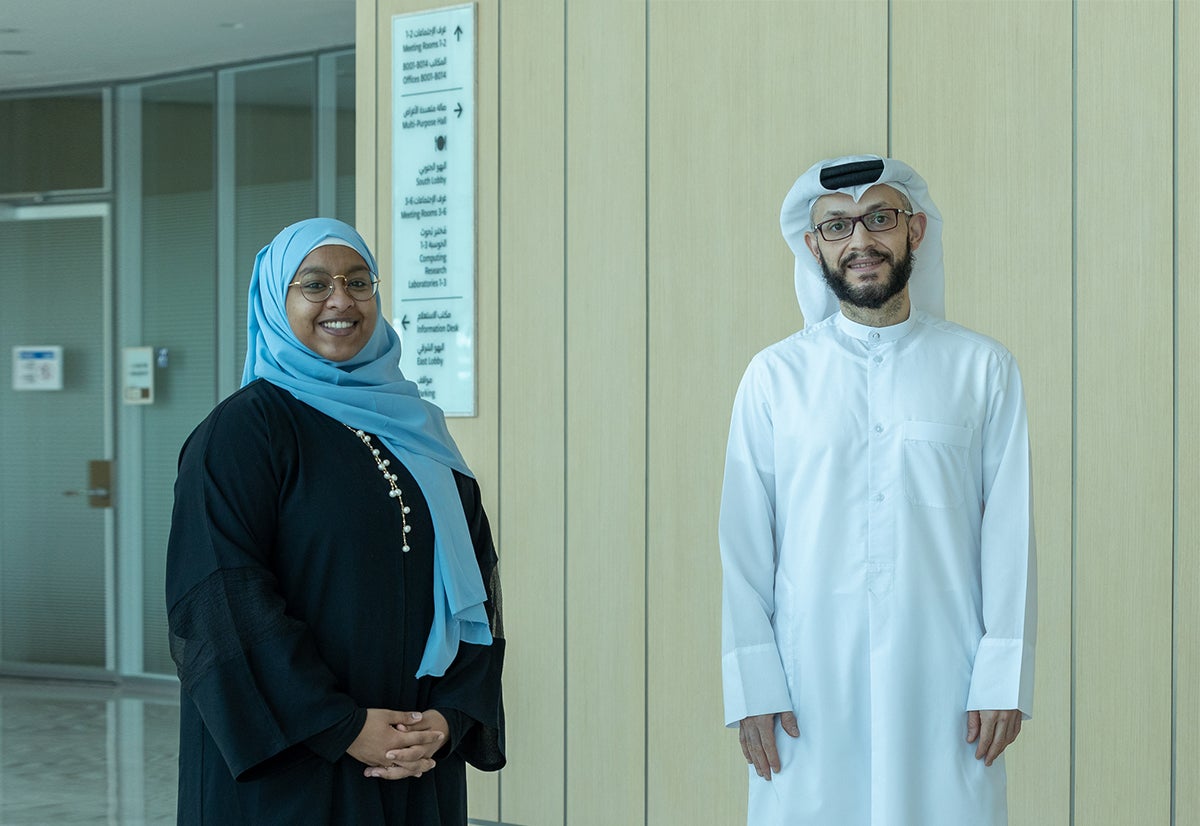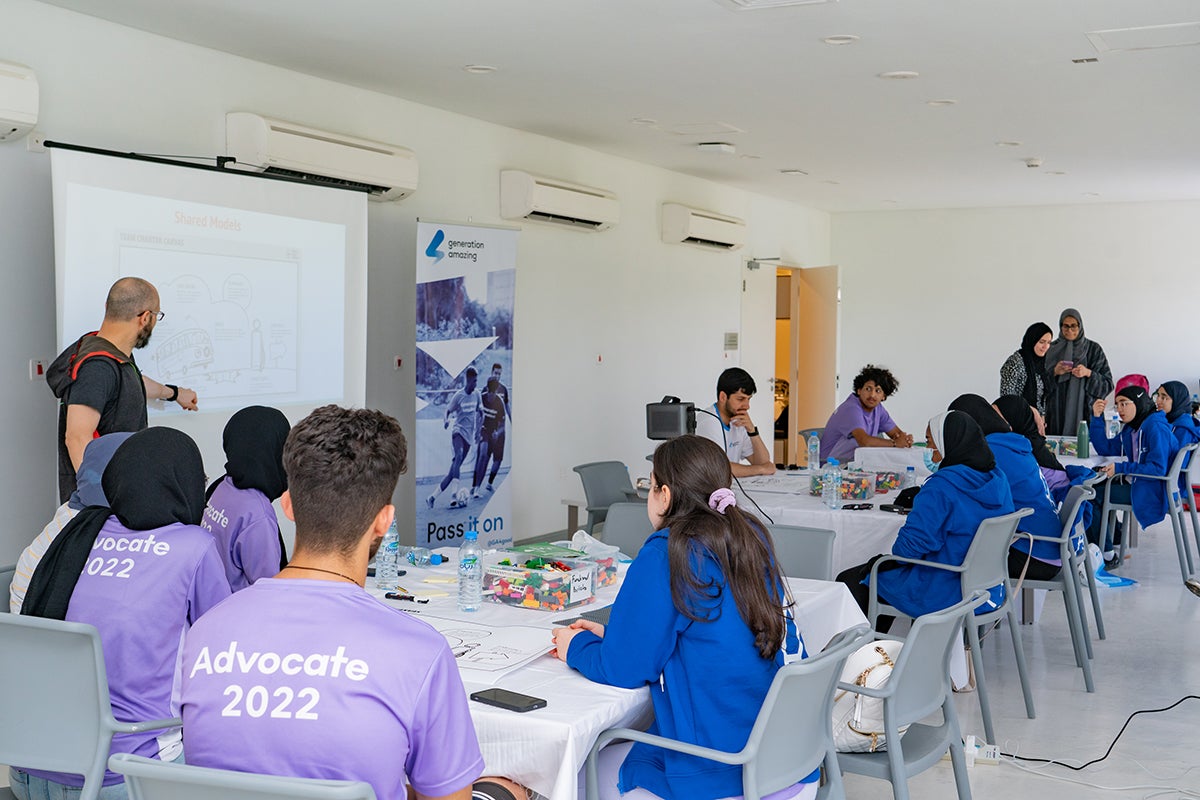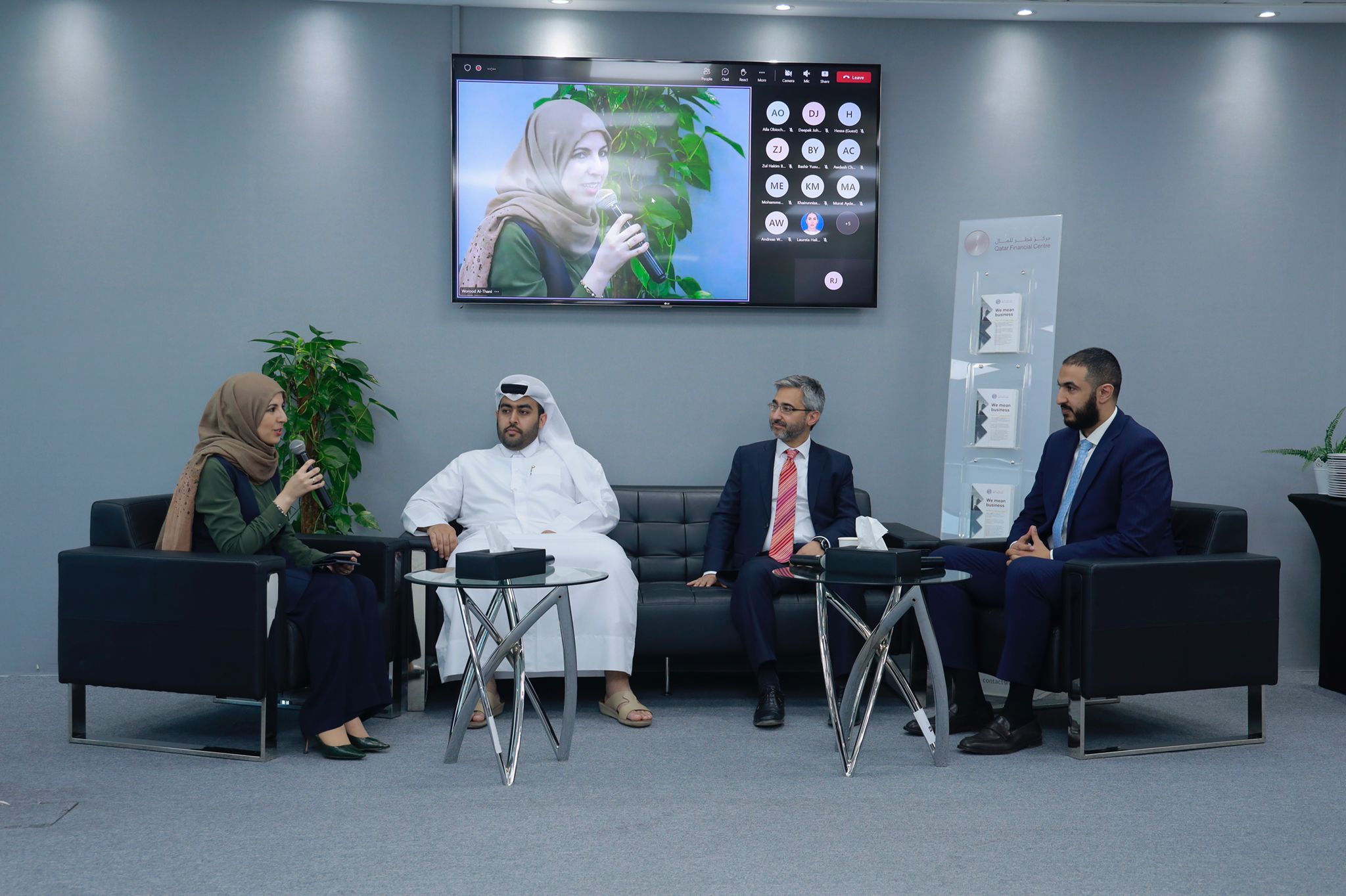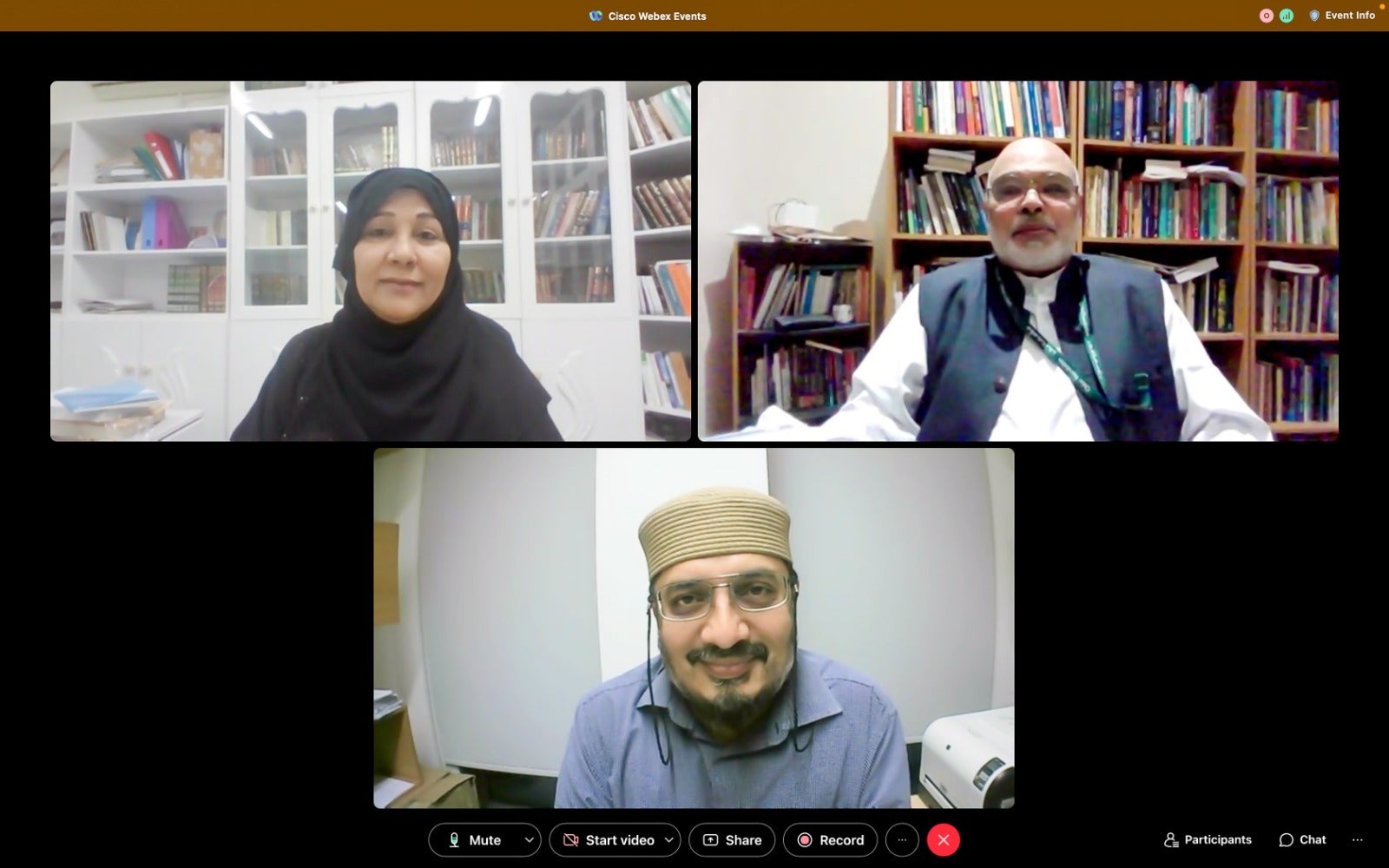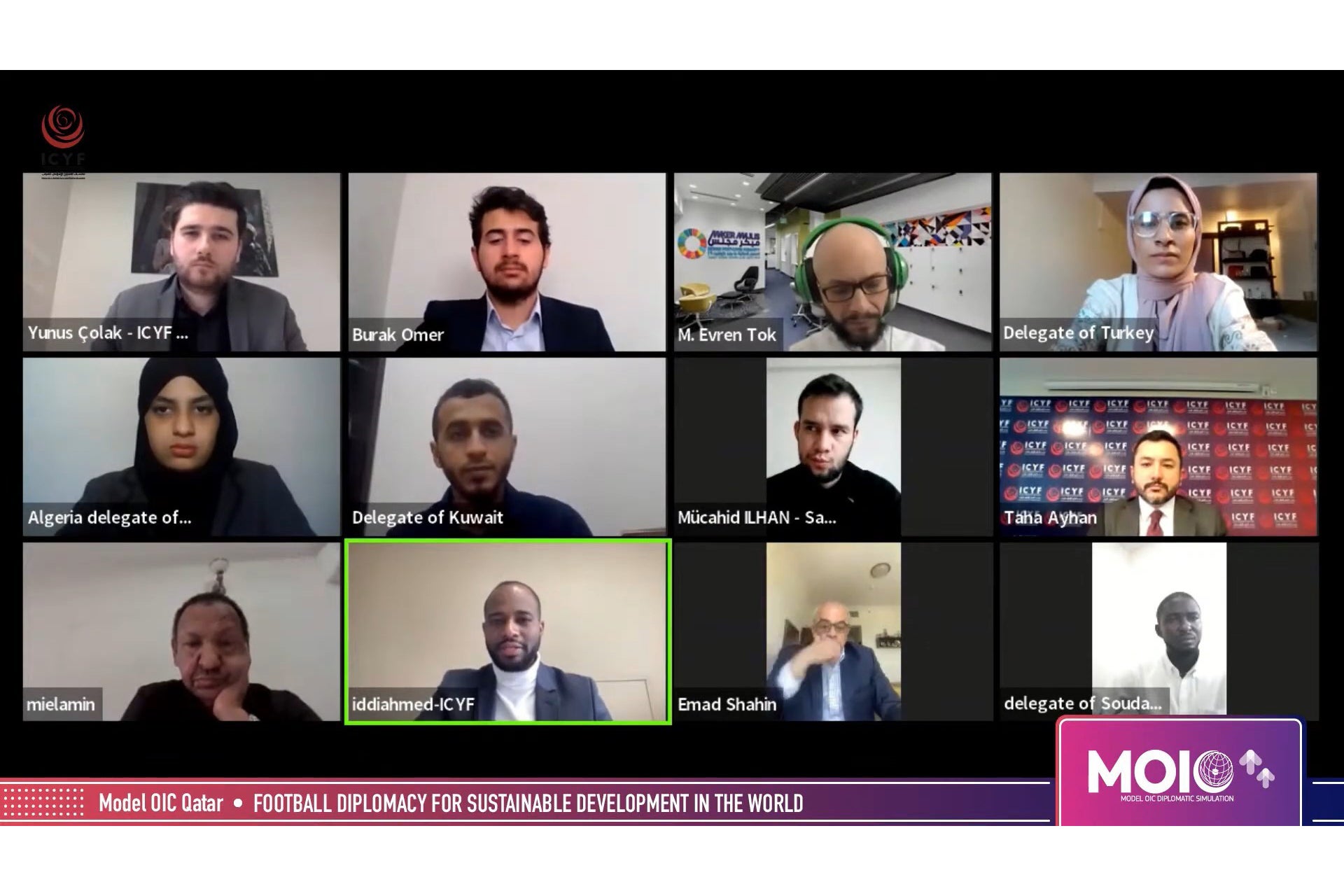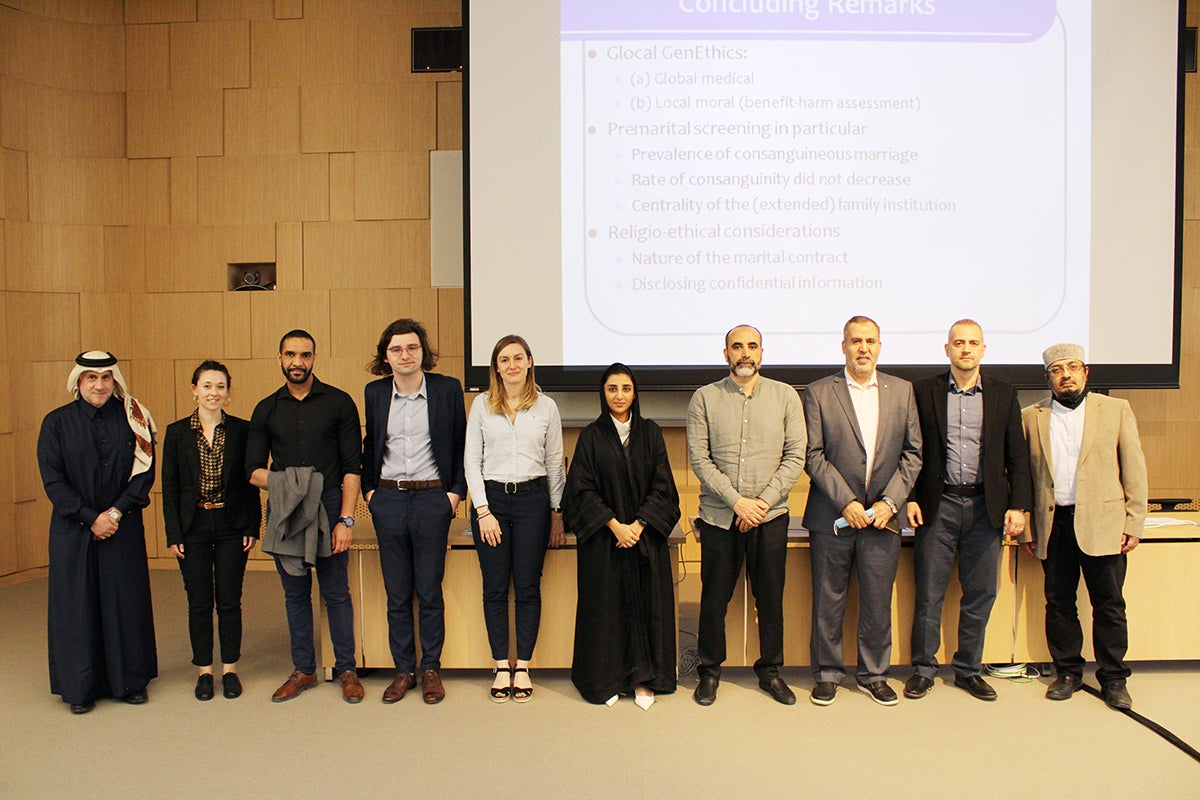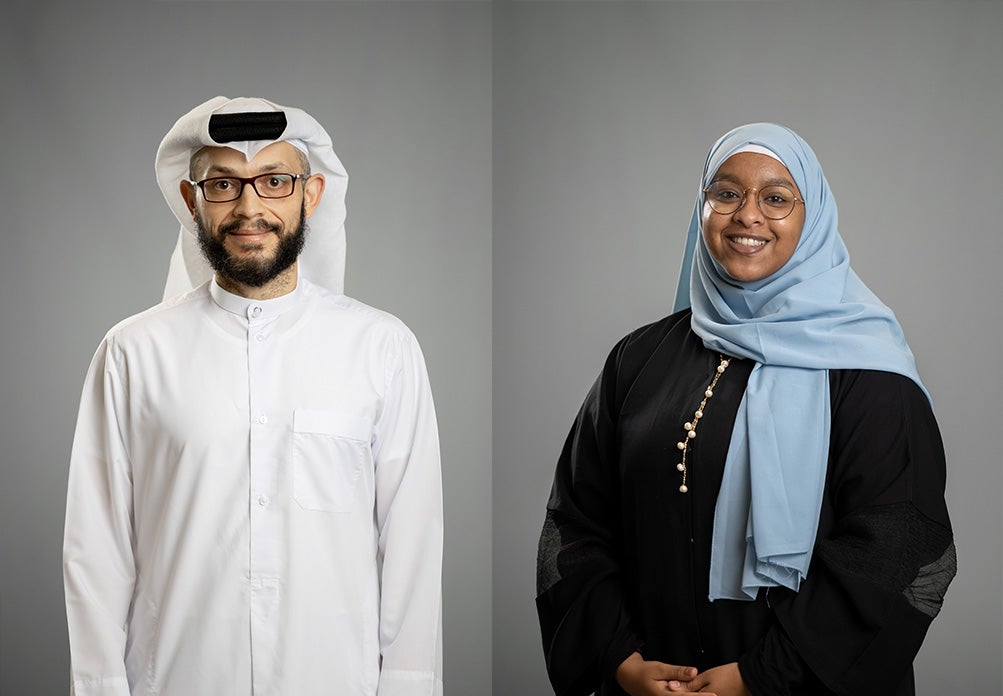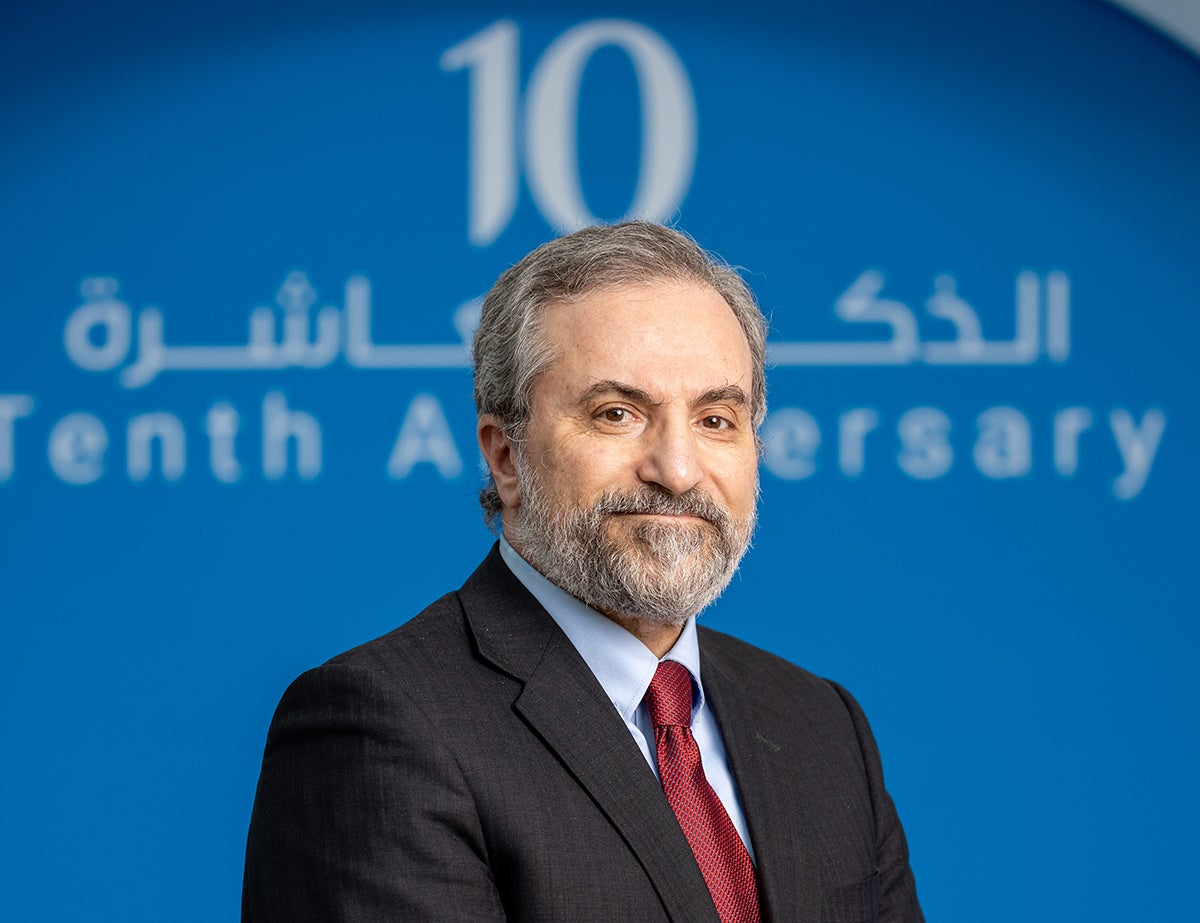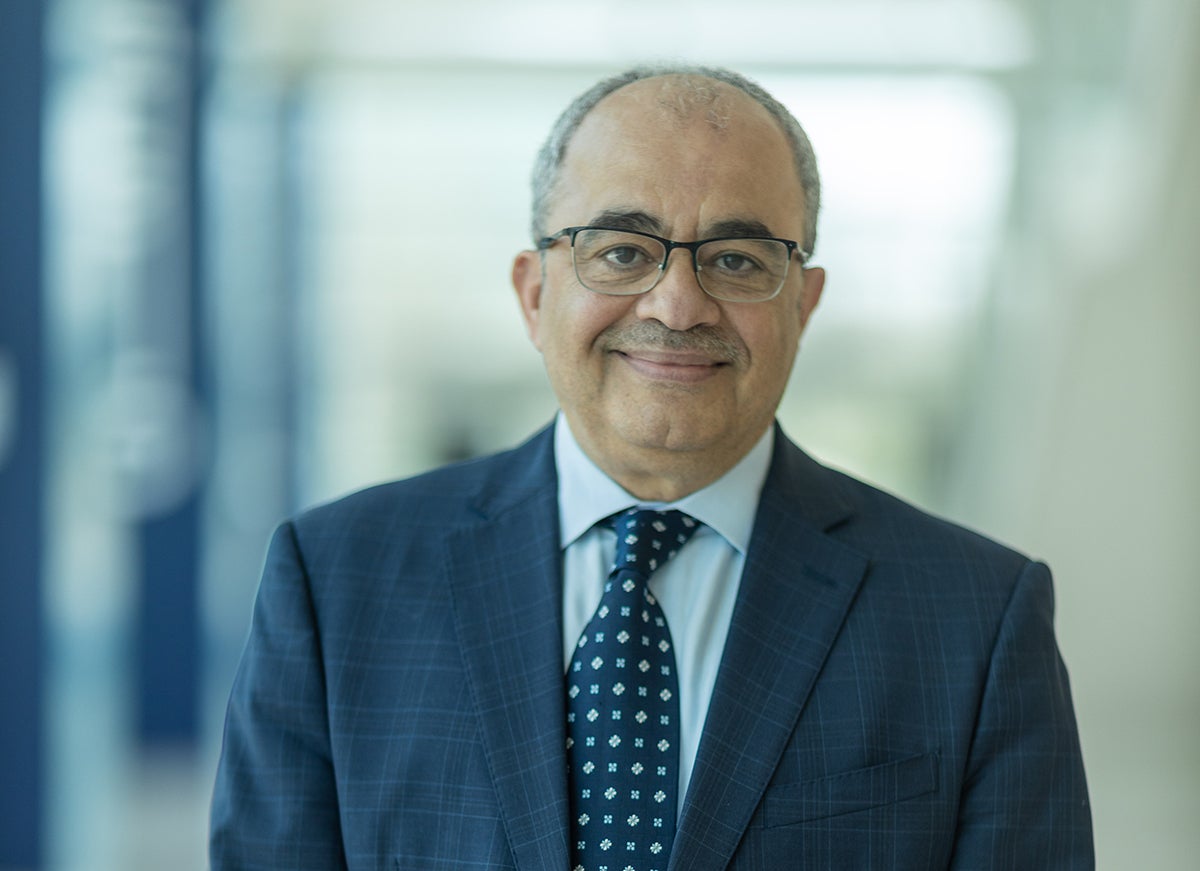
College of Islamic Studies Welcomes HE Dr. Mutlaq Al Qahtani’s In-Depth Diplomatic Experiences
Students of peace and conflict studies glean key insights from the diplomatic field
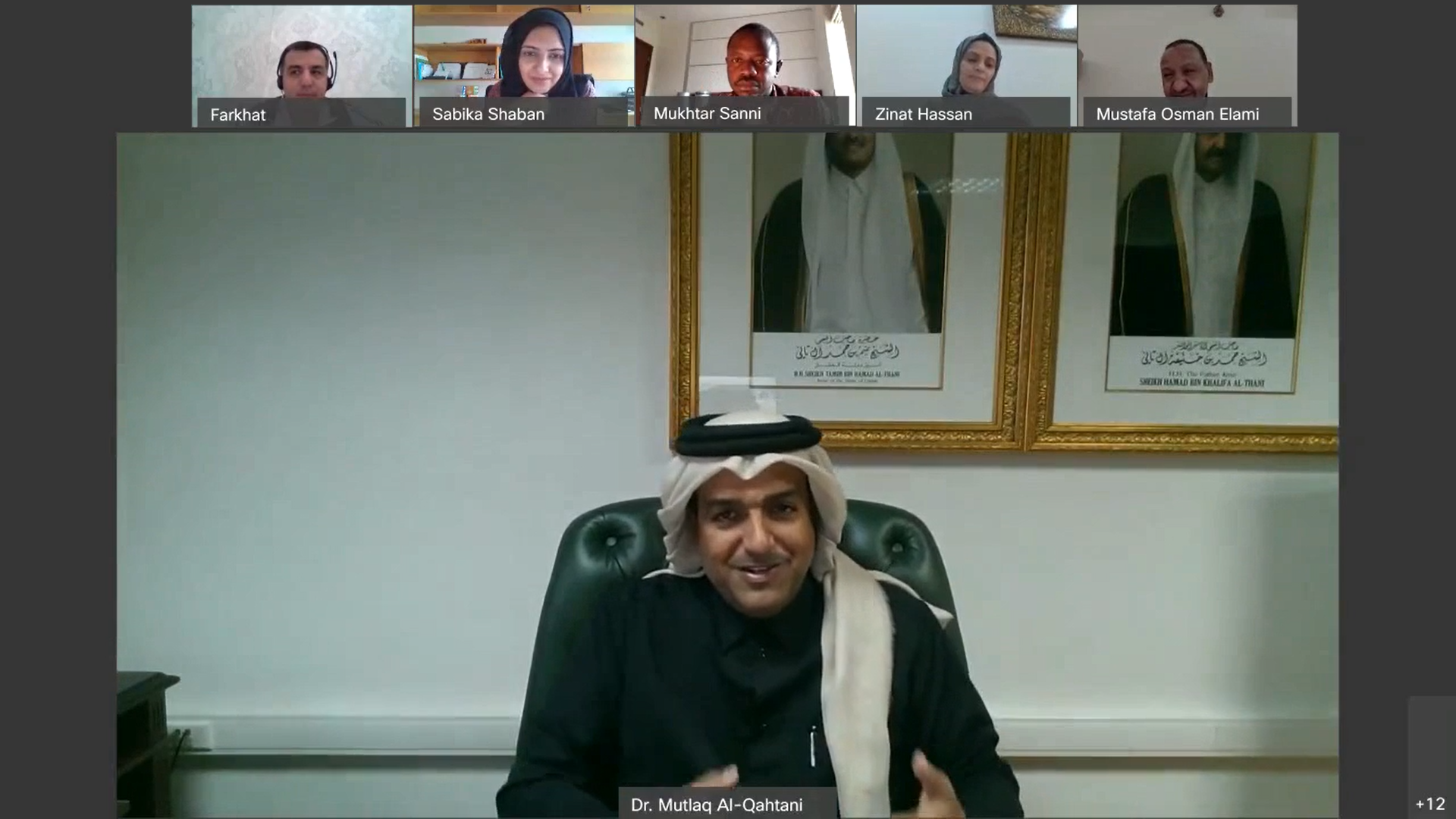
The College of Islamic Studies (CIS) at Hamad Bin Khalifa University (HBKU) recently welcomed a highly distinguished guest lecturer for their course on “Islam, Conflict Transformation, and Peacebuilding,” which forms a critical component of its Master’s Program on Islam and Global Affairs.
His Excellency Dr. Mutlaq bin Majed Al Qahtani, Special Envoy of the Minister of Foreign Affairs for Counterterrorism and Mediation in Conflict Resolution, delivered a lecture on the Qatari experience in conflict resolution. As a recipient of the United Nations Institute for Training and Research (UNITAR) Award for Best Negotiator in 2020, Dr. Al Qahtani had a rich repertoire of in-the-field anecdotes that exemplified the trends and challenges in peacebuilding, the complexities that mediators face in highly politicized situations, and the realities of peace diplomacy. He utilized Afghanistan as a case study, and highlighted Qatar’s unique position which has allowed the state to develop its own brand of diplomacy in the wider political context.
Graduate students had an opportunity to pose questions that surveyed global developments in the Islamic world and explore them through a lens of peacebuilding potential. Dr. Al Qahtani shared his views in response, and drew attention to cultural and political nuances that are often unnoticed, the added entanglements of disparate political ties, and the related successes and failures of diplomacy.
Dr. Mustafa Osman Elamin, a member of faculty at CIS, hosted the lecture and facilitated the engagement through his own experiences as former Foreign Minister and Minister of Investment of Sudan. With regards to his initiative to bring thought leaders and practitioners to the classroom, he said: “The peacebuilding world is a continually evolving discipline and one in which academia and practice continually interact and propel its development. Ideally, our graduate students not only need a strong academic foundation to delve into the complexities of political affairs, but understand that much of it is fed by the actions and advancements of agents in the field. We are deeply thankful to His Excellency Dr. Al Qahtani for his masterful framing of what the practice of conflict transformation truly entails and the intricacy of political diplomacy.”
For more information on the work of the College of Islamic Studies, please visit cis.hbku.edu.qa.
Related News
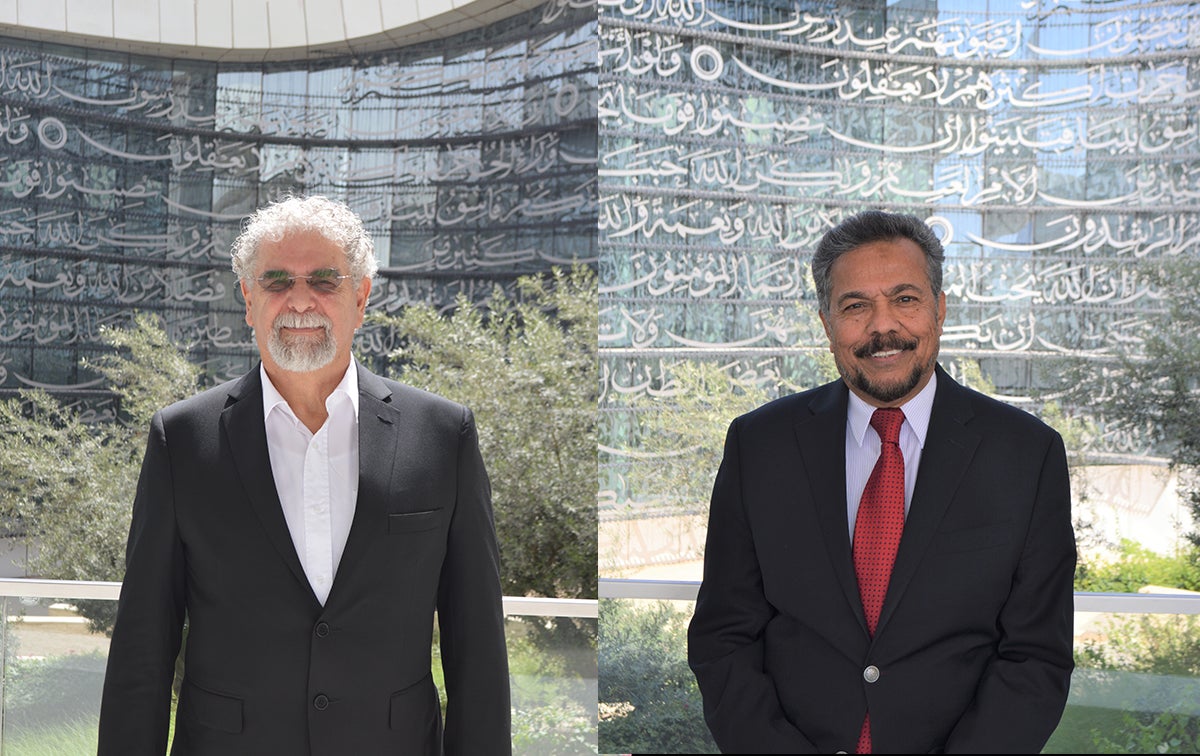
College of Islamic Studies’ Books on Fintech and Migration Among Top Titles Globally
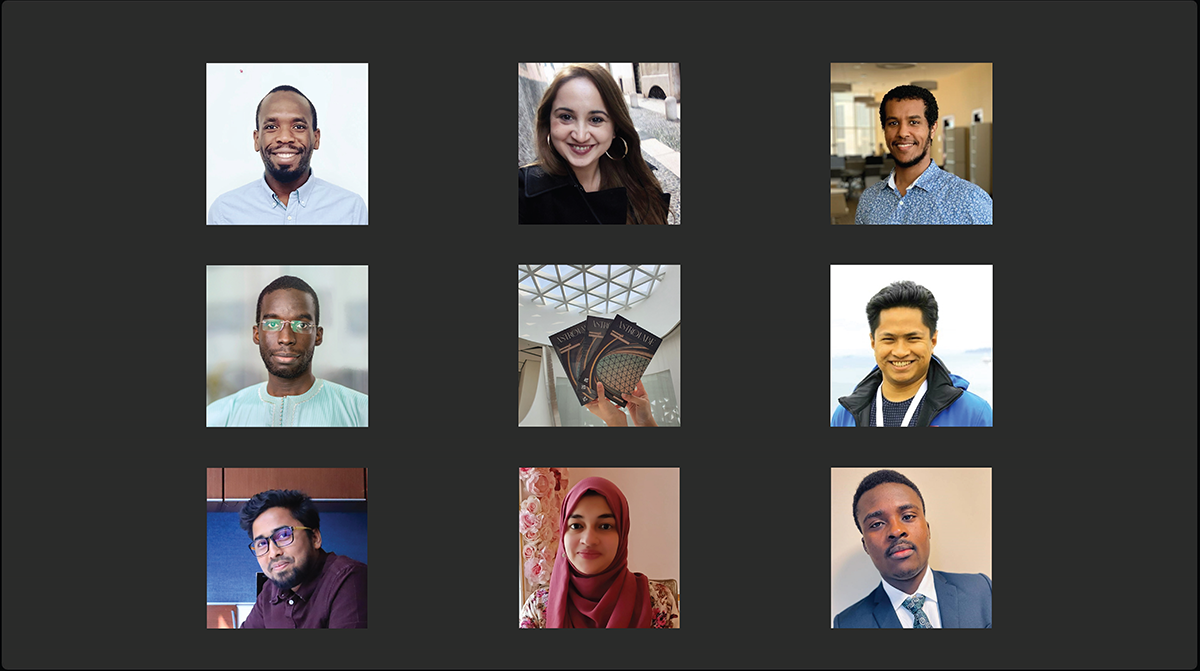
College of Islamic Studies Launches Third Volume of Astrolabe Student Research Journal
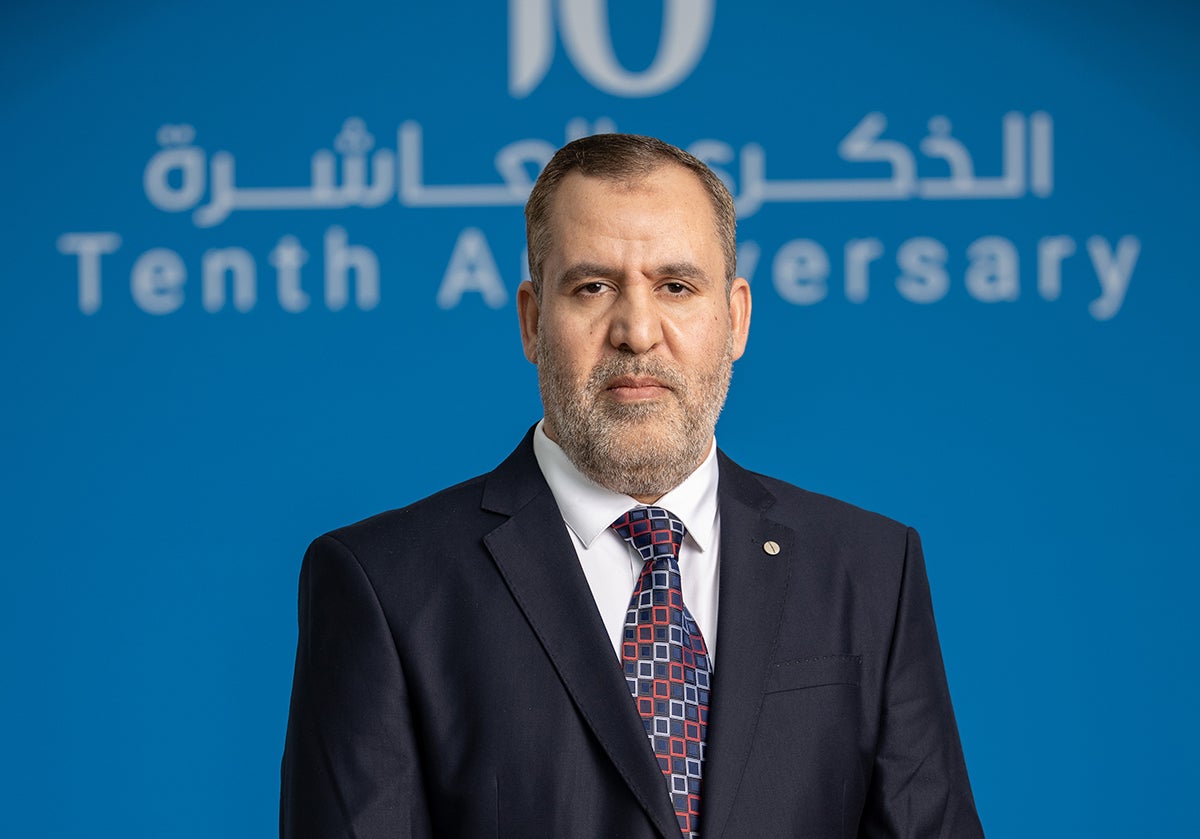
Interview with Dr. Mohamed El-Gammal, Associate Professor, College of Islamic Studies (CIS)
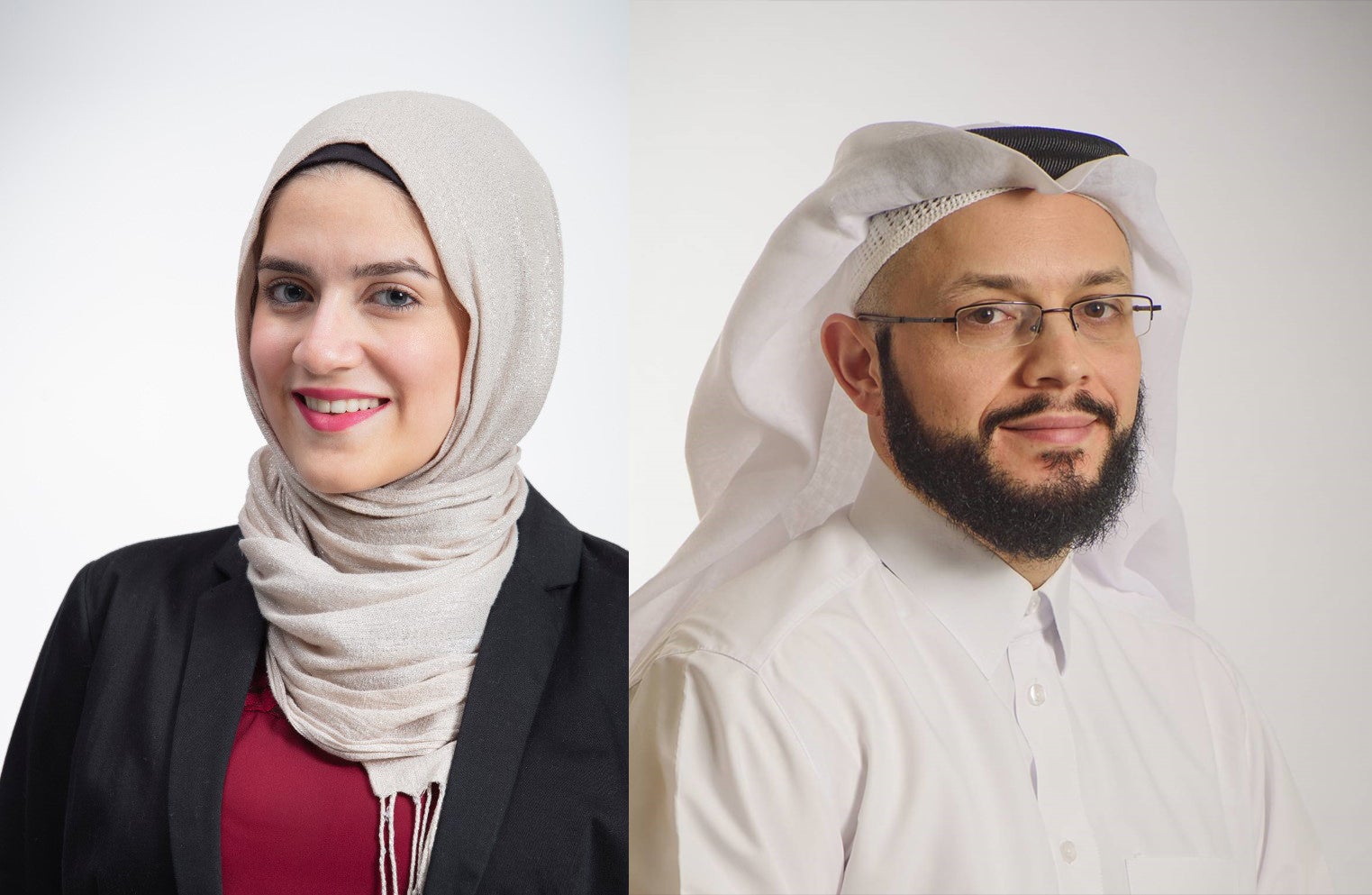
College of Islamic Studies’ Faculty Contribute to New Book on Qatar’s FIFA 2022 Legacy

College of Islamic Studies’ Books on Fintech and Migration Among Top Titles Globally

College of Islamic Studies Launches Third Volume of Astrolabe Student Research Journal

Interview with Dr. Mohamed El-Gammal, Associate Professor, College of Islamic Studies (CIS)

College of Islamic Studies’ Faculty Contribute to New Book on Qatar’s FIFA 2022 Legacy

College of Islamic Studies’ Books on Fintech and Migration Among Top Titles Globally

College of Islamic Studies Launches Third Volume of Astrolabe Student Research Journal

Interview with Dr. Mohamed El-Gammal, Associate Professor, College of Islamic Studies (CIS)

College of Islamic Studies’ Faculty Contribute to New Book on Qatar’s FIFA 2022 Legacy

College of Islamic Studies’ Books on Fintech and Migration Among Top Titles Globally

College of Islamic Studies Launches Third Volume of Astrolabe Student Research Journal

Interview with Dr. Mohamed El-Gammal, Associate Professor, College of Islamic Studies (CIS)

College of Islamic Studies’ Faculty Contribute to New Book on Qatar’s FIFA 2022 Legacy

College of Islamic Studies’ Books on Fintech and Migration Among Top Titles Globally

College of Islamic Studies Launches Third Volume of Astrolabe Student Research Journal

Interview with Dr. Mohamed El-Gammal, Associate Professor, College of Islamic Studies (CIS)

College of Islamic Studies’ Faculty Contribute to New Book on Qatar’s FIFA 2022 Legacy

College of Islamic Studies’ Books on Fintech and Migration Among Top Titles Globally

College of Islamic Studies Launches Third Volume of Astrolabe Student Research Journal

Interview with Dr. Mohamed El-Gammal, Associate Professor, College of Islamic Studies (CIS)

College of Islamic Studies’ Faculty Contribute to New Book on Qatar’s FIFA 2022 Legacy

College of Islamic Studies’ Books on Fintech and Migration Among Top Titles Globally

College of Islamic Studies Launches Third Volume of Astrolabe Student Research Journal

Interview with Dr. Mohamed El-Gammal, Associate Professor, College of Islamic Studies (CIS)

College of Islamic Studies’ Faculty Contribute to New Book on Qatar’s FIFA 2022 Legacy

College of Islamic Studies’ Books on Fintech and Migration Among Top Titles Globally

College of Islamic Studies Launches Third Volume of Astrolabe Student Research Journal

Interview with Dr. Mohamed El-Gammal, Associate Professor, College of Islamic Studies (CIS)

College of Islamic Studies’ Faculty Contribute to New Book on Qatar’s FIFA 2022 Legacy

College of Islamic Studies’ Books on Fintech and Migration Among Top Titles Globally

College of Islamic Studies Launches Third Volume of Astrolabe Student Research Journal

Interview with Dr. Mohamed El-Gammal, Associate Professor, College of Islamic Studies (CIS)

College of Islamic Studies’ Faculty Contribute to New Book on Qatar’s FIFA 2022 Legacy

College of Islamic Studies’ Books on Fintech and Migration Among Top Titles Globally

College of Islamic Studies Launches Third Volume of Astrolabe Student Research Journal

Interview with Dr. Mohamed El-Gammal, Associate Professor, College of Islamic Studies (CIS)

College of Islamic Studies’ Faculty Contribute to New Book on Qatar’s FIFA 2022 Legacy

College of Islamic Studies’ Books on Fintech and Migration Among Top Titles Globally

College of Islamic Studies Launches Third Volume of Astrolabe Student Research Journal

Interview with Dr. Mohamed El-Gammal, Associate Professor, College of Islamic Studies (CIS)

College of Islamic Studies’ Faculty Contribute to New Book on Qatar’s FIFA 2022 Legacy

College of Islamic Studies’ Books on Fintech and Migration Among Top Titles Globally

College of Islamic Studies Launches Third Volume of Astrolabe Student Research Journal

Interview with Dr. Mohamed El-Gammal, Associate Professor, College of Islamic Studies (CIS)

College of Islamic Studies’ Faculty Contribute to New Book on Qatar’s FIFA 2022 Legacy

College of Islamic Studies’ Books on Fintech and Migration Among Top Titles Globally

College of Islamic Studies Launches Third Volume of Astrolabe Student Research Journal

Interview with Dr. Mohamed El-Gammal, Associate Professor, College of Islamic Studies (CIS)

College of Islamic Studies’ Faculty Contribute to New Book on Qatar’s FIFA 2022 Legacy

College of Islamic Studies’ Books on Fintech and Migration Among Top Titles Globally

College of Islamic Studies Launches Third Volume of Astrolabe Student Research Journal

Interview with Dr. Mohamed El-Gammal, Associate Professor, College of Islamic Studies (CIS)

College of Islamic Studies’ Faculty Contribute to New Book on Qatar’s FIFA 2022 Legacy

College of Islamic Studies’ Books on Fintech and Migration Among Top Titles Globally

College of Islamic Studies Launches Third Volume of Astrolabe Student Research Journal

Interview with Dr. Mohamed El-Gammal, Associate Professor, College of Islamic Studies (CIS)

College of Islamic Studies’ Faculty Contribute to New Book on Qatar’s FIFA 2022 Legacy

College of Islamic Studies’ Books on Fintech and Migration Among Top Titles Globally

College of Islamic Studies Launches Third Volume of Astrolabe Student Research Journal

Interview with Dr. Mohamed El-Gammal, Associate Professor, College of Islamic Studies (CIS)

College of Islamic Studies’ Faculty Contribute to New Book on Qatar’s FIFA 2022 Legacy

College of Islamic Studies’ Books on Fintech and Migration Among Top Titles Globally

College of Islamic Studies Launches Third Volume of Astrolabe Student Research Journal

Interview with Dr. Mohamed El-Gammal, Associate Professor, College of Islamic Studies (CIS)

College of Islamic Studies’ Faculty Contribute to New Book on Qatar’s FIFA 2022 Legacy

College of Islamic Studies’ Books on Fintech and Migration Among Top Titles Globally

College of Islamic Studies Launches Third Volume of Astrolabe Student Research Journal

Interview with Dr. Mohamed El-Gammal, Associate Professor, College of Islamic Studies (CIS)

College of Islamic Studies’ Faculty Contribute to New Book on Qatar’s FIFA 2022 Legacy

College of Islamic Studies’ Books on Fintech and Migration Among Top Titles Globally

College of Islamic Studies Launches Third Volume of Astrolabe Student Research Journal

Interview with Dr. Mohamed El-Gammal, Associate Professor, College of Islamic Studies (CIS)

College of Islamic Studies’ Faculty Contribute to New Book on Qatar’s FIFA 2022 Legacy

College of Islamic Studies’ Books on Fintech and Migration Among Top Titles Globally

College of Islamic Studies Launches Third Volume of Astrolabe Student Research Journal

Interview with Dr. Mohamed El-Gammal, Associate Professor, College of Islamic Studies (CIS)

College of Islamic Studies’ Faculty Contribute to New Book on Qatar’s FIFA 2022 Legacy

College of Islamic Studies’ Books on Fintech and Migration Among Top Titles Globally

College of Islamic Studies Launches Third Volume of Astrolabe Student Research Journal

Interview with Dr. Mohamed El-Gammal, Associate Professor, College of Islamic Studies (CIS)

College of Islamic Studies’ Faculty Contribute to New Book on Qatar’s FIFA 2022 Legacy

College of Islamic Studies’ Books on Fintech and Migration Among Top Titles Globally

College of Islamic Studies Launches Third Volume of Astrolabe Student Research Journal

Interview with Dr. Mohamed El-Gammal, Associate Professor, College of Islamic Studies (CIS)

College of Islamic Studies’ Faculty Contribute to New Book on Qatar’s FIFA 2022 Legacy

College of Islamic Studies’ Books on Fintech and Migration Among Top Titles Globally

College of Islamic Studies Launches Third Volume of Astrolabe Student Research Journal

Interview with Dr. Mohamed El-Gammal, Associate Professor, College of Islamic Studies (CIS)

College of Islamic Studies’ Faculty Contribute to New Book on Qatar’s FIFA 2022 Legacy

College of Islamic Studies’ Books on Fintech and Migration Among Top Titles Globally

College of Islamic Studies Launches Third Volume of Astrolabe Student Research Journal

Interview with Dr. Mohamed El-Gammal, Associate Professor, College of Islamic Studies (CIS)

College of Islamic Studies’ Faculty Contribute to New Book on Qatar’s FIFA 2022 Legacy

College of Islamic Studies’ Books on Fintech and Migration Among Top Titles Globally

College of Islamic Studies Launches Third Volume of Astrolabe Student Research Journal

Interview with Dr. Mohamed El-Gammal, Associate Professor, College of Islamic Studies (CIS)

College of Islamic Studies’ Faculty Contribute to New Book on Qatar’s FIFA 2022 Legacy

College of Islamic Studies’ Books on Fintech and Migration Among Top Titles Globally

College of Islamic Studies Launches Third Volume of Astrolabe Student Research Journal

Interview with Dr. Mohamed El-Gammal, Associate Professor, College of Islamic Studies (CIS)

College of Islamic Studies’ Faculty Contribute to New Book on Qatar’s FIFA 2022 Legacy

College of Islamic Studies’ Books on Fintech and Migration Among Top Titles Globally

College of Islamic Studies Launches Third Volume of Astrolabe Student Research Journal

Interview with Dr. Mohamed El-Gammal, Associate Professor, College of Islamic Studies (CIS)

College of Islamic Studies’ Faculty Contribute to New Book on Qatar’s FIFA 2022 Legacy

College of Islamic Studies’ Books on Fintech and Migration Among Top Titles Globally

College of Islamic Studies Launches Third Volume of Astrolabe Student Research Journal

Interview with Dr. Mohamed El-Gammal, Associate Professor, College of Islamic Studies (CIS)

College of Islamic Studies’ Faculty Contribute to New Book on Qatar’s FIFA 2022 Legacy

College of Islamic Studies’ Books on Fintech and Migration Among Top Titles Globally

College of Islamic Studies Launches Third Volume of Astrolabe Student Research Journal

Interview with Dr. Mohamed El-Gammal, Associate Professor, College of Islamic Studies (CIS)

College of Islamic Studies’ Faculty Contribute to New Book on Qatar’s FIFA 2022 Legacy

College of Islamic Studies’ Books on Fintech and Migration Among Top Titles Globally

College of Islamic Studies Launches Third Volume of Astrolabe Student Research Journal

Interview with Dr. Mohamed El-Gammal, Associate Professor, College of Islamic Studies (CIS)

College of Islamic Studies’ Faculty Contribute to New Book on Qatar’s FIFA 2022 Legacy

College of Islamic Studies’ Books on Fintech and Migration Among Top Titles Globally

College of Islamic Studies Launches Third Volume of Astrolabe Student Research Journal

Interview with Dr. Mohamed El-Gammal, Associate Professor, College of Islamic Studies (CIS)

College of Islamic Studies’ Faculty Contribute to New Book on Qatar’s FIFA 2022 Legacy

College of Islamic Studies’ Books on Fintech and Migration Among Top Titles Globally

College of Islamic Studies Launches Third Volume of Astrolabe Student Research Journal

Interview with Dr. Mohamed El-Gammal, Associate Professor, College of Islamic Studies (CIS)

College of Islamic Studies’ Faculty Contribute to New Book on Qatar’s FIFA 2022 Legacy

College of Islamic Studies’ Books on Fintech and Migration Among Top Titles Globally

College of Islamic Studies Launches Third Volume of Astrolabe Student Research Journal

Interview with Dr. Mohamed El-Gammal, Associate Professor, College of Islamic Studies (CIS)

College of Islamic Studies’ Faculty Contribute to New Book on Qatar’s FIFA 2022 Legacy

College of Islamic Studies’ Books on Fintech and Migration Among Top Titles Globally

College of Islamic Studies Launches Third Volume of Astrolabe Student Research Journal

Interview with Dr. Mohamed El-Gammal, Associate Professor, College of Islamic Studies (CIS)

College of Islamic Studies’ Faculty Contribute to New Book on Qatar’s FIFA 2022 Legacy

College of Islamic Studies’ Books on Fintech and Migration Among Top Titles Globally

College of Islamic Studies Launches Third Volume of Astrolabe Student Research Journal

Interview with Dr. Mohamed El-Gammal, Associate Professor, College of Islamic Studies (CIS)

College of Islamic Studies’ Faculty Contribute to New Book on Qatar’s FIFA 2022 Legacy

College of Islamic Studies’ Books on Fintech and Migration Among Top Titles Globally

College of Islamic Studies Launches Third Volume of Astrolabe Student Research Journal

Interview with Dr. Mohamed El-Gammal, Associate Professor, College of Islamic Studies (CIS)

College of Islamic Studies’ Faculty Contribute to New Book on Qatar’s FIFA 2022 Legacy

College of Islamic Studies’ Books on Fintech and Migration Among Top Titles Globally

College of Islamic Studies Launches Third Volume of Astrolabe Student Research Journal

Interview with Dr. Mohamed El-Gammal, Associate Professor, College of Islamic Studies (CIS)

College of Islamic Studies’ Faculty Contribute to New Book on Qatar’s FIFA 2022 Legacy

College of Islamic Studies’ Books on Fintech and Migration Among Top Titles Globally

College of Islamic Studies Launches Third Volume of Astrolabe Student Research Journal

Interview with Dr. Mohamed El-Gammal, Associate Professor, College of Islamic Studies (CIS)

College of Islamic Studies’ Faculty Contribute to New Book on Qatar’s FIFA 2022 Legacy

College of Islamic Studies’ Books on Fintech and Migration Among Top Titles Globally

College of Islamic Studies Launches Third Volume of Astrolabe Student Research Journal

Interview with Dr. Mohamed El-Gammal, Associate Professor, College of Islamic Studies (CIS)

College of Islamic Studies’ Faculty Contribute to New Book on Qatar’s FIFA 2022 Legacy

College of Islamic Studies’ Books on Fintech and Migration Among Top Titles Globally

College of Islamic Studies Launches Third Volume of Astrolabe Student Research Journal

Interview with Dr. Mohamed El-Gammal, Associate Professor, College of Islamic Studies (CIS)

College of Islamic Studies’ Faculty Contribute to New Book on Qatar’s FIFA 2022 Legacy






